#licenses
Text
Good riddance to the Open Gaming License
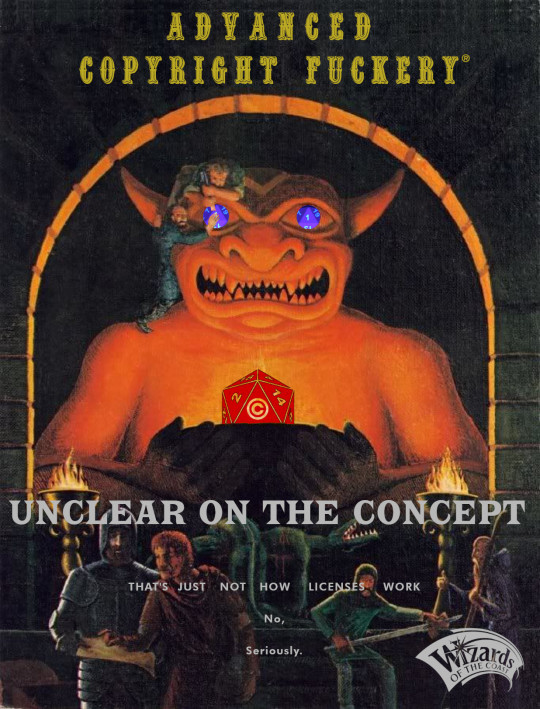
Last week, Gizmodo’s Linda Codega caught a fantastic scoop — a leaked report of Hasbro’s plan to revoke the decades-old Open Gaming License, which subsidiary Wizards Of the Coast promulgated as an allegedly open sandbox for people seeking to extend, remix or improve Dungeons and Dragons:
https://gizmodo.com/dnd-wizards-of-the-coast-ogl-1-1-open-gaming-license-1849950634
The report set off a shitstorm among D&D fans and the broader TTRPG community — not just because it was evidence of yet more enshittification of D&D by a faceless corporate monopolist, but because Hasbro was seemingly poised to take back the commons that RPG players and designers had built over decades, having taken WOTC and the OGL at their word.
Gamers were right to be worried. Giant companies love to rugpull their fans, tempting them into a commons with lofty promises of a system that we will all have a stake in, using the fans for unpaid creative labor, then enclosing the fans’ work and selling it back to them. It’s a tale as old as CDDB and Disgracenote:
https://en.wikipedia.org/wiki/CDDB#History
(Disclosure: I am a long-serving volunteer board-member for MetaBrainz, which maintains MusicBrainz, a free, open, community-managed and transparent alternative to Gracenote, explicitly designed to resist the kind of commons-stealing enclosure that led to the CDDB debacle.)
https://musicbrainz.org/
Free/open licenses were invented specifically to prevent this kind of fuckery. First there was the GPL and its successor software licenses, then Creative Commons and its own successors. One important factor in these licenses: they contain the word “irrevocable.” That means that if you build on licensed content, you don’t have to worry about having the license yanked out from under you later. It’s rugproof.
Now, the OGL does not contain the word “irrevocable.” Rather, the OGL is “perpetual.” To a layperson, these two terms may seem interchangeable, but this is one of those fine lawerly distinctions that trip up normies all the time. In lawyerspeak, a “perpetual” license is one whose revocation doesn’t come automatically after a certain time (unlike, say, a one-year car-lease, which automatically terminates at the end of the year). Unless a license is “irrevocable,” the licensor can terminate it whenever they want to.
This is exactly the kind of thing that trips up people who roll their own licenses, and people who trust those licenses. The OGL predates the Creative Commons licenses, but it neatly illustrates the problem with letting corporate lawyers — rather than public-interest nonprofits — unleash “open” licenses on an unsuspecting, legally unsophisticated audience.
The perpetual/irrevocable switcheroo is the least of the problems with the OGL. As Rob Bodine— an actual lawyer, as well as a dice lawyer — wrote back in 2019, the OGL is a grossly defective instrument that is significantly worse than useless.
https://gsllcblog.com/2019/08/26/part3ogl/
The issue lies with what the OGL actually licenses. Decades of copyright maximalism has convinced millions of people that anything you can imagine is “intellectual property,” and that this is indistinguishable from real property, which means that no one can use it without your permission.
The copyrightpilling of the world sets people up for all kinds of scams, because copyright just doesn’t work like that. This wholly erroneous view of copyright grooms normies to be suckers for every sharp grifter who comes along promising that everything imaginable is property-in-waiting (remember SpiceDAO?):
https://onezero.medium.com/crypto-copyright-bdf24f48bf99
Copyright is a lot more complex than “anything you can imagine is your property and that means no one else can use it.” For starters, copyright draws a fundamental distinction between ideas and expression. Copyright does not apply to ideas — the idea, say, of elves and dwarves and such running around a dungeon, killing monsters. That is emphatically not copyrightable.
Copyright also doesn’t cover abstract systems or methods — like, say, a game whose dice-tables follow well-established mathematical formulae to create a “balanced” system for combat and adventuring. Anyone can make one of these, including by copying, improving or modifying an existing one that someone else made. That’s what “uncopyrightable” means.
Finally, there are the exceptions and limitations to copyright — things that you are allowed to do with copyrighted work, without first seeking permission from the creator or copyright’s proprietor. The best-known exception is US law is fair use, a complex doctrine that is often incorrectly characterized as turning on “four factors” that determine whether a use is fair or not.
In reality, the four factors are a starting point that courts are allowed and encouraged to consider when determining the fairness of a use, but some of the most consequential fair use cases in Supreme Court history flunk one, several, or even all of the four factors (for example, the Betamax decision that legalized VCRs in 1984, which fails all four).
Beyond fair use, there are other exceptions and limitations, like the di minimis exemption that allows for incidental uses of tiny fragments of copyrighted work without permission, even if those uses are not fair use. Copyright, in other words, is “fact-intensive,” and there are many ways you can legally use a copyrighted work without a license.
Which brings me back to the OGL, and what, specifically, it licenses. The OGL is a license that only grants you permission to use the things that WOTC can’t copyright — “the game mechanic [including] the methods, procedures, processes and routines.” In other words, the OGL gives you permission to use things you don’t need permission to use.
But maybe the OGL grants you permission to use more things, beyond those things you’re allowed to use anyway? Nope. The OGL specifically exempts:
Product and product line names, logos and identifying marks including trade dress; artifacts; creatures characters; stories, storylines, plots, thematic elements, dialogue, incidents, language, artwork, symbols, designs, depictions, likenesses, formats, poses, concepts, themes and graphic, photographic and other visual or audio representations; names and descriptions of characters, spells, enchantments, personalities, teams, personas, likenesses and special abilities; places, locations, environments, creatures, equipment, magical or supernatural abilities or effects, logos, symbols, or graphic designs; and any other trademark or registered trademark…
Now, there are places where the uncopyrightable parts of D&D mingle with the copyrightable parts, and there’s a legal term for this: merger. Merger came up for gamers in 2018, when the provocateur Robert Hovden got the US Copyright Office to certify copyright in a Magic: The Gathering deck:
https://pluralistic.net/2021/08/14/angels-and-demons/#owning-culture
If you want to learn more about merger, you need to study up on Kregos and Eckes, which are beautifully explained in the “Open Intellectual Property Casebook,” a free resource created by Jennifer Jenkins and James Boyle:
https://web.law.duke.edu/cspd/openip/#q01
Jenkins and Boyle explicitly created their open casebook as an answer to another act of enclosure: a greedy textbook publisher cornered the market on IP textbook and charged every law student — and everyone curious about the law — $200 to learn about merger and other doctrines.
As EFF Senior Staff Attorney Kit Walsh writes in her must-read analysis of the OGL, this means “the only benefit that OGL offers, legally, is that you can copy verbatim some descriptions of some elements that otherwise might arguably rise to the level of copyrightability.”
https://www.eff.org/deeplinks/2023/01/beware-gifts-dragons-how-dds-open-gaming-license-may-have-become-trap-creators
But like I said, it’s not just that the OGL fails to give you rights — it actually takes away rights you already have to D&D. That’s because — as Walsh points out — fair use and the other copyright limitations and exceptions give you rights to use D&D content, but the OGL is a contract whereby you surrender those rights, promising only to use D&D stuff according to WOTC’s explicit wishes.
“For example, absent this agreement, you have a legal right to create a work using noncopyrightable elements of D&D or making fair use of copyrightable elements and to say that that work is compatible with Dungeons and Dragons. In many contexts you also have the right to use the logo to name the game (something called “nominative fair use” in trademark law). You can certainly use some of the language, concepts, themes, descriptions, and so forth. Accepting this license almost certainly means signing away rights to use these elements. Like Sauron’s rings of power, the gift of the OGL came with strings attached.”
And here’s where it starts to get interesting. Since the OGL launched in 2000, a huge proportion of game designers have agreed to its terms, tricked into signing away their rights. If Hasbro does go through with canceling the OGL, it will release those game designers from the shitty, deceptive OGL.
According to the leaks, the new OGL is even worse than the original versions — but you don’t have to take those terms! Notwithstanding the fact that the OGL says that “using…Open Game Content” means that you accede to the license terms, that is just not how contracts work.
Walsh: “Contracts require an offer, acceptance, and some kind of value in exchange, called ‘consideration.’ If you sell a game, you are inviting the reader to play it, full stop. Any additional obligations require more than a rote assertion.”
“For someone who wants to make a game that is similar mechanically to Dungeons and Dragons, and even announce that the game is compatible with Dungeons and Dragons, it has always been more advantageous as a matter of law to ignore the OGL.”
Walsh finishes her analysis by pointing to some good licenses, like the GPL and Creative Commons, “written to serve the interests of creative communities, rather than a corporation.” Many open communities — like the programmers who created GNU/Linux, or the music fans who created Musicbrainz, were formed after outrageous acts of enclosure by greedy corporations.
If you’re a game designer who was pissed off because the OGL was getting ganked — and if you’re even more pissed off now that you’ve discovered that the OGL was a piece of shit all along — there’s a lesson there. The OGL tricked a generation of designers into thinking they were building on a commons. They weren’t — but they could.
This is a great moment to start — or contribute to — real open gaming content, licensed under standard, universal licenses like Creative Commons. Rolling your own license has always been a bad idea, comparable to rolling your own encryption in the annals of ways-to-fuck-up-your-own-life-and-the-lives-of-many-others. There is an opportunity here — Hasbro unintentionally proved that gamers want to collaborate on shared gaming systems.
That’s the true lesson here: if you want a commons, you’re not alone. You’ve got company, like Kit Walsh herself, who happens to be a brilliant game-designer who won a Nebula Award for her game “Thirsty Sword Lesbians”:
https://evilhat.com/product/thirsty-sword-lesbians/
[Image ID: A remixed version of David Trampier's 'Eye of Moloch,' the cover of the first edition of the AD&D Player's Handbook. It has been altered so the title reads 'Advanced Copyright Fuckery. Unclear on the Concept. That's Just Not How Licenses Work. No, Seriously.' The eyes of the idol have been replaced by D20s displaying a critical fail '1.' Its chest bears another D20 whose showing face is a copyright symbol.]
#pluralistic#copyfraud#wizards of the coast#wotc#dungeons and dragons#d&d#ogl#open gaming license#eff#fair use#kit walsh#consideration#licenses
8K notes
·
View notes
Text
For people working on their own systems, and those that have published their own systems already, what licenses do you recommend? I'm obviously aware of the OGL (and its flaws) and Creative Commons, but what else is there? I've also come across Paizo's ORC license (though I haven't looked into it so far) and heard mention of the Shadowdark license, but I wondered if anyone here has advice or use-cases for the different licenses available.
#thecoppercompendium#ttrpg community#ttrpg#licenses#thecoppercompendium discussion#OGL#ORC license#Shadowdark license#Creative Commons
8 notes
·
View notes
Note
What's to stop someone from printing and selling games on disk for a console without seeking certification?
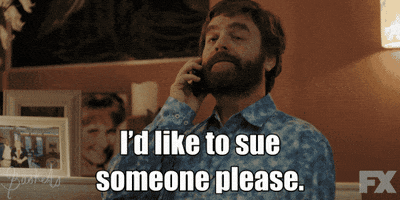
The point of passing certification is that the first party (i.e. Sony/Microsoft/Nintendo) will grant the game publisher a license to use their IP in a limited capacity to sell the game. This license allows the publishers to use things in advertising like the console logos, images of the consoles, trademarks such as the words "Playstation" or "Xbox" or "Switch" and related accessories (e.g. "Joycon", "Sixaxis", "Kinect", etc.). Without the license from the console makers to use these elements, any means of advertisement using them would be copyright or trademark infringement and subject to takedown notices, cease and desist letters, and even lawsuits.
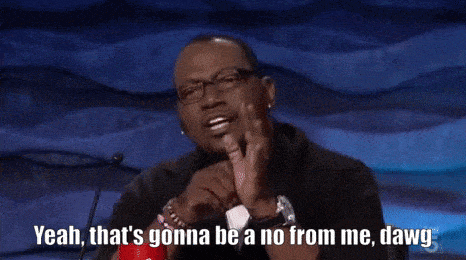
Further, if anyone attempts to bypass the console manufacturers on the sales end, it is likely that the console manufacturers would retaliate by yanking any developer accounts and permabanning any console dev kits from connecting to the console development network. It would theoretically be possible to get around blacklisted developer accounts by reverse engineering everything, but the game still wouldn't work with the PSN, XBL, or Nintendo Online.

It is possible to sell an unlicensed game (and some have done it in the past to a limited extent), but it is quite difficult to do so to any realistic degree without mentioning the name of the console the game runs on, console developer accounts and hardware development kits to build the game on, or the ability for players to connect to the console's online network (and thus inaccessible features like achievements, multiplayer, patching, digital distribution, etc.).
[Join us on Discord] and/or [Support us on Patreon]
Got a burning question you want answered?
Short questions: Ask a Game Dev on Twitter
Long questions: Ask a Game Dev on Tumblr
Frequent Questions: The FAQ
29 notes
·
View notes
Text
OKAY, SO, I've heard a lot of folks talk about wanting to put their stuff under Creative Commons licenses, but being worried about megacorps using it and pulling up the ladder.
Which, I'd probably agree, is a sensible worry. Which is why I'm sharing this license with y'all that I found that does a really good job of addressing that!
Basically, it allows for people to use your work with creator credit even commercially, but only if it's on their own or as a part of a worker-owned enterprise.
So, it provides almost the maximum rights possible to the smaller creators this sort of thing is meant to benefit, while still keeping it away from the greedy megacorp bastards.
It's super cool, but it seems like I'm the only one who's heard of it, so that's why I'm boosting it! I'd love to see what works folks apply it to in the future...
147 notes
·
View notes
Text

Anti-Counterfeit measures in Arizona's license only seen with a black light.
#interesting#interesting facts#nature is everything#discover#thats interesting#thats incredible#thats insane#arizona#drivers license#drivers licenses#license#licenses#whatthe#whatthehell#what the hell#what the heck#what the shit#thats the post#woah woah woah#like woah#woah#woahhhh#woah dude#woah :0#but woah#woahg#optical illusion#optical illusions#illusions#illusion
3 notes
·
View notes
Video
youtube
Dungeons & Dragons Rolls a 1 on New License (OGL 1.1) ft. Matt Colville [source]
8 notes
·
View notes
Text
The drivers license renewal system in my state is fucked up, and I’m not even going to get into the fucked-up-ness of appointments just to renew a license and all the requirements for that, and the months-long wait for the next one. I’m going to bitch about the smaller problems that could VERY EASILY be solved if anybody wanted to actually make things better. Clearly they do not.
1. Print the new license on-site instead of making the person wait up to 10 business days to get it mailed. My old employer could make new security badges in 30-60 seconds. You can have a printer at every DMV (probably two printers, given the low reliability of printers in general) and make the new cards right there.
2. Failing that, put an official seal on the temporary printed license. Maybe have it notarized or something like that. Because nobody accept temporary licenses for anything. They have some limited function, I guess - if you get pulled over you can say “see, my license isn’t expired, it was renewed last week” and maybe the cop will check and then not ticket you for having an expired license. But you can’t use it to pick up medication that requires an ID, you can’t buy alcohol with it, you can’t really use it because everyone is like “lol how do I know it’s not fake.” So put some special seal on it and make it a crime to copy the seal, and amend TABC, drug, banking, etc. laws so that if someone accepts a temporary ID with the seal and it otherwise seems legit, they can’t be held liable if it turned out to be a fake, the person with the fake is the one who gets fined.
This whole thing is stupid. I need to pick up a Schedule 2 prescription. I can’t pick it up until my new license arrives in the mail because an expired card with a current, valid paper card isn’t good enough. Fuck you. I’ll live, but I’ll be in more pain than necessary because it’s not bad enough to justify an expensive hospital trip but it’s still very unpleasant and an unnecessarily cruel situation brought about by overly picky ID laws and shitty procedures. And by the time I get my license I’ll probably have healed enough from the antibiotics and acid reducers that the painkillers will be pointless.
I DID try to get in before it expired in March. In December the closest appointment I could get was mid-March, but then they didn’t accept my proof of residency and legal status (seriously?) so I had to do it over and the next available appointment - 30 miles away! - was June. Next one locally was late August, nope no thanks, I’ll just travel a bit. Also they didn’t even ask me for proof of residency at the second place but they did make me prove I wasn’t an “undocumented immigrant.” First of all, it’s a driver’s license, not an application to run for President in 2024, so who cares? Second, I’ve had a license in this state since 1997 - why do you suddenly give a shit now about where I was born? It doesn’t affect my ability to drive. I could have been born on the Moon for all it matters, I clearly passed my driving test and eye exam.
1 note
·
View note
Text
Jacking off my big white cock
Male boy gay biggest porn hot sex and american first time Fucking Hot
Busty MILF Kendra Lust double fucked by black dudes
Busty Brunette Jasmeen Lefleur Titty Fucking Pervy Dude
Novinha tocando uma siririca
Arab Hoe Jimena Lago Earns Money From Fucking Boss
Camera Shy Lightskin Pussy, Purple Vibrator & a BBC : Part 2
Stunning hot lesbian cute teens sensual pussy licking
Pounding a haitian thot
Sexy teen fingers herself to orgasm while watching porn
#grandmother's#licenses#re-explanation#expertised#atame#lazulite#reworded#tamburello#underproduces#dehydroascorbic#euhyostyly#olefinic#frigoric#gastroenteroanastomosis#unfalse#plainsoled#infirmary#whump#elegy#uninferable
2 notes
·
View notes
Text
How to Steer Clear of a Driver’s License Suspension
How to Steer Clear of a Driver's License Suspension
Like most people, you probably use your driver’s license daily, from going to work to running errands to traveling through your state and country. An active driving license authorizes you to operate a motor vehicle as you please!
No one enjoys a dreadful visit to the Department of Motor Vehicles (DMV) or dealing with law enforcement. Nonetheless, if you are on the brink of receiving a suspended license, you might be jeopardizing your freedom to drive again. In this circumstance, you may need to fight your license suspension to avoid significant fines. Though each situation is unique, you may increase your chances of avoiding your suspension.

First, Become familiar with the point system:
In the United States, the Department of Motor Vehicles (DMV) may suspend or permanently revoke your license if they have probable cause. Law enforcement officers must have a valid reason to take you off the road. Some of the most common reasons are as follows:
Dangerous, reckless, careless, or unauthorized driving
Excessive speeding
Being Impaired or intoxicated while driving
Recurring ticketing or carrying high points on file
The point-based system gauges the validity of your current driving license and displays your record history. Driving infractions over time causes you to accumulate points. Depending on your state, if you collect enough points in a certain amount of time, authorities may suspend your driver’s license. After the first-time suspension, just a few more violations added to your record would trigger another subsequent suspension.
Secondly, Be aware of your license status:
An expired license simply means your current driver's license is outdated and is required to get renewed. If you get pulled over by a law enforcement officer, they will typically issue you a non-criminal traffic citation.
A suspended license means that the Department of Motor Vehicles (DMV) has decided to take your driving privileges. Mainly because of financial reasons, such as failing to pay a traffic citation.
If you decide to continue driving after receiving a suspension, you are taking a considerable risk. Long story short, if you do not respect the violations, you make your case much worse. The Department of Motor Vehicles (DMV) can further limit your driving privileges, which could even lead to arrest and end up in jail.
Lastly, Consider a Defense Strategy to Avoid Suspension
If you drive your vehicle daily, let alone do it for a living, you should have a defensive approach to avoid further suspensions. Services are out there to help you keep up to date with your driver's license status.
It’s simple, visit avoidsuspension.com and sign up with any subscription option that fits you best. Then simply fill out basic information, enter your driver’s license info, and then you're all set! In less than two minute’s you can be assured that your driver’s license status will never go under your radar. Avoidsuspension.com is the perfect solution to prevent you from forgetting the status of your license, whether it’s expired, suspended, or other status updates. We all make mistakes, but with AvoidSuspension, making the mistake of driving with an expired license will no longer be a stress factor in your life. Be sure to visit their website and sign up today!
#avoidsuspension #drivesafe #avoidcitations #mylicensegotsuspended #drivingwhilesuspended
References:
#avoidsuspension#drivesafe#drivers#drivers license#licenses#expired licenses#suspended license#how to avoid suspension
2 notes
·
View notes
Photo
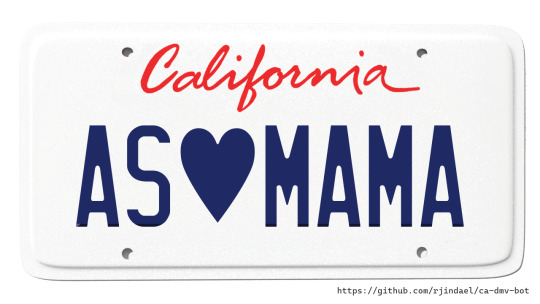
Customer: A'S MAMA, MY KIDS ALL HAVE "A" NAMES.
DMV: ASS MAMA
Verdict: ACCEPTED
#California license plate with text AS (heart) MAMA#bot#ca-dmv-bot#california#dmv#funny#government#lol#public records
27K notes
·
View notes
Text

oh shit rpg maker xp is completely free to own this week on steam??

#I dont use rpgm anymore but this is still wonderful to know about#if you add it to your account then it shouldn't be removed once the week is over#you should have it forever for free#just know that this license might only be for free games and you might have to actually purchase the software before you can make commercia#indie game dev#game dev#rpg maker
28K notes
·
View notes
Text
John Deere's repair fake-out
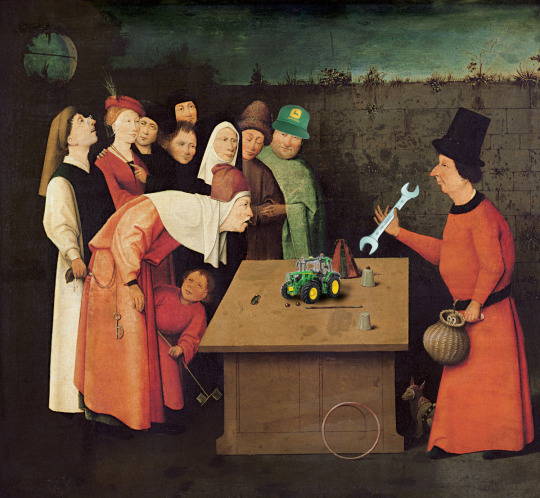
Last week, a seeming miracle came to pass: John Deere, the Big Ag monopolist that — along with Apple — has led the Axis of Evil that killed, delayed and sabotaged dozens of Right to Repair laws, sued for peace, announcing a Memorandum of Understanding with the American Farm Bureau Federation to make it easier for farmers to fix their own tractors:
https://www.fb.org/files/AFBF_John_Deere_MOU.pdf
This is a move that’s both badly needed and long overdue. Deere abuses copyright law to force farmers to pay for official repairs — even when the farmer does the repair. That’s possible thanks to a practice called VIN locking, in which engine parts come with DRM that prevents the tractor from recognizing them until they pay hundreds of dollars for a John Deere technician to come to their farm and type an unlock code into the tractor’s console:
https://doctorow.medium.com/about-those-kill-switched-ukrainian-tractors-bc93f471b9c8
Like all DRM, VIN locks are covered by Section 1201 of the Digital Millennium Copyright Act (DMCA), a 1998 law that criminalizes distributing tools to bypass “access controls,” even if you do so for a lawful purpose (say, to fix your own tractor using a part you paid for). Violations of DMCA 1201 carry a penalty of 5 years in prison and a $500k fine — for a first offense.
This means that Deere owners are locked into using Deere for repairs, which also means that if Deere decides something isn’t broken, a farmer can’t get it fixed. This is very bad news indeed, because John Deere tractors are just computers in a fancy, mobile case, and John Deere is incredibly bad at digital security:
https://pluralistic.net/2021/04/23/reputation-laundry/#deere-john
That’s scary stuff, because John Deere is a monopolist, and a successful attack on the always-connected, networked tractors and other equipment it supplies to the world’s farmers could endanger the global food supply.
Deere doesn’t want to make insecure tractors, but it also doesn’t want to be embarrassed by security researchers who point out that its security is defective. Because security researchers have to bypass Deere tractors’ locks to probe their security, Deere can leverage DMCA1201 into a veto over who gets to warn the public about the mistakes it made.
It’s not just security researchers that Deere gets to gag: the company uses its repair monopoly to threaten farmers who complain about its business practices, holding their million-dollar farm equipment hostage to their silence:
https://pluralistic.net/2022/05/31/dealers-choice/#be-a-shame-if-something-were-to-happen-to-it
This all adds up to what Jay Freeman calls “felony contempt of business model,” an abuse of copyright law that allows a monopolistic corporation to reach beyond its own walls and impose its will on it customers, critics and competitors:
https://locusmag.com/2020/09/cory-doctorow-ip/
If Deere was finally suing for peace in the Repair Wars, well, that was wonderful news indeed — as I said, a seeming miracle.
But — like all miracles — it was too good to be true.
The MOU that Deere and the Farm Bureau signed is full of poison pills, gotchas, fine-print and mendacity, as Lauren Goode documents in her Wired article, “Right-to-Repair Advocates Question John Deere’s New Promises”:
https://www.wired.com/story/right-to-repair-advocates-question-john-deeres-new-promises/
For starters, the MOU makes the Farm Bureau promise to end its advocacy for state Right to Repair bills, which would create a repair system governed by democratically accountable laws, not corporate fiat. Clearly, Deere has seen the writing on the wall, after the passage in 2002 of Right to Repair laws in New York and Colorado:
https://www.eff.org/deeplinks/2022/06/when-drm-comes-your-wheelchair
These two bills broke the corporate anti-repair coalition’s winning streak, which saw dozens of state R2R bills defeated:
https://pluralistic.net/2021/05/26/nixing-the-fix/#r2r
Deere’s deal-with-the-devil is a cynical ploy to brake R2R’s momentum and ensure that any repairs are carried out on Deere’s terms. Now, about those terms…
Deere’s deal offers independent repair shops access to diagnostic tools and parts “on fair and reasonable terms,” a murky phrase that can mean whatever Deere decides it means. Crucially, the deal is silent on whether Deere will supply the tools needed to activate VIN locks, meaning that farmers will still be at Deere’s mercy when they effect their own repairs.
What’s more, the deal itself isn’t legally binding, and Deere can cancel it at any time. Once you dig past the headline, the Deere’s Damascene conversion to repair advocacy starts to look awfully superficial — and deceptive.
One person who wasn’t fooled is sick.codes, the hacker who has done the most important work on reverse-engineering Deere’s computer systems, culminating in last summer’s live, on-stage hack of a John Deere tractor at Defcon:
https://pluralistic.net/2022/08/15/deere-in-headlights/#doh-a-deere
Shortly after the announcement, Sick.codes tweeted how the fine-print in the MOU would have prevented him from doing the work he’s already done (including “a direct stab at me lol”):
https://twitter.com/sickcodes/status/1612484935495057409
As with other instances of monopolistic, corporate copyfraud — like, say, the deceptive Open Gaming License — the John Deere capitulation is really a bid to take away your rights, dressed up as a gift of more rights:
https://mostlysignssomeportents.tumblr.com/post/706163316598407168/good-riddance-to-the-open-gaming-license
[Image ID: Hieronymus Bosch's painting, 'The Conjurer.' The Conjuror's shell-game table holds a small John Deere tractor that the audience of yokels gawps at. One yokel is wearing a John Deere hat. The conjurer is holding a wrench.]
1K notes
·
View notes
Text
no judgements at all here. i was thinking about the possibility of moving out and wanted to know what age other people did
#i don’t know a lot of what i want in the future but i do know i want to at least get my driver’s license and have my own place#hopefully in the next few years after university#in my family it’s typical to get married and then move out but i’m not sure if i ever will so i want to at least live by myself
22K notes
·
View notes
Text


If I didn't draw this fucking thing at least once I would probably die
#sketches#the boy and the heron#Took some significant artistic license to make this look more grotesque. sorry?
25K notes
·
View notes
Text
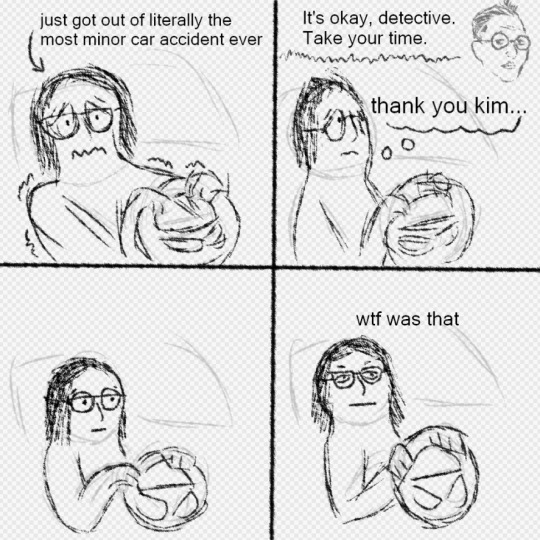
need to share an experience i had 30 minutes ago
(edit: thanks to @walks-the-ages for providing and reminding me to put alt text, sorry it slips my mind alot lol)
#my hands are still shaking to be quite honest i could not put a lot of effort into this.#but like. brain. why did you do that#literally i have been like hopelessly obsessed with de nonstop thinking abt it for the past couple of days it is Scaring me#it is terminal its soooo fucking chronic#disco elysium#kim kitsuragi#for anyone who wants to know i bumped into some guys car that was stopped for a school bus. i think my brain errored and thought#my foot was fully pressing down on the brake pedal but it wasnt.#i am like 99.99 percent sure neither of us had any major damage to our cars but we still filed a police report just in case#because insurance do be a bitch. dudes back bumper was scratched lightly and my front license plate has a dent now#also literally my first ever car accident that ive had ever yippee yay
28K notes
·
View notes
Text
Microsoft's Journey into AI: Artificial Intelligence Hype vs. Reality. #ArtificialIntelligence,#AI
youtube
⬇⬇⬇ Follow Me On Social Media ⬇⬇⬇ 📸 Instagram: 🔎 / thinkconsulting1 👉Facebook: 🔎 https://www.facebook.com/profile.php?... 👉Twitter : 🔎 / cservicescorp 👉LinkedIn : 🔎 / consultingservicescorporation 🚀🚀✅Check out other videos on my channel✅🚀🚀 👉Everything you need to know about Apple Vision Pro ▶️ • Everything you need to know about App... 👉AlphaGeometry: Bridging the Divide Between Artificial Intelligence and Mathematical Olympiads. #AI ▶️ • Bridging the Divide Between Artificia... 👉Unpredictable Luck: From Gas Station Mishap to Lottery Jackpot ▶️ • Unpredictable Luck: From Gas Station ... 👉Unlocking Success: The 10 Unstoppable Habits of High Achievers. #Success#thinkconsulting ▶️ • Unlocking Success: The 10 Unstoppable... ///////////////////////////////////////////////////////////////////////////////////////////////////////////////////////////////////////////////////////////////////////////////////////////////// Thanks for watching the video from my channel. I really hope that you find this video to be extremely useful. If you have any inquiries, please post them in the comments section below. You also have the option of contributing your thoughts in the comments area.
#AIart#ArtificialIntelligence#Copyright#Creativity#DataRights#DigitalArt#Ethics#GenerativeAI#InternetCulture#Licenses#MachineLearning#OnlineArt#TechPolicy#ContentCreation#Cybersecurity#IntellectualProperty#LawAndTech#ContentStrategy#ContentMarketing#TechNews#EmergingTech#NightshadeTool#ArtisticIntegrity#AIinArt#DigitalRights#TechEthics#GlazeProject#CopyrightLaw#DataScrapingDebate#FairUse
0 notes